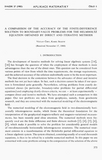Article
MSC:
35J05,
65F05,
65F10,
65N20,
65N22,
86A25 | MR 0674982 | Zbl 0511.65074 | DOI: 10.21136/AM.1982.103983
Full entry |
 PDF
(2.4 MB)
Feedback
PDF
(2.4 MB)
Feedback
 PDF
(2.4 MB)
Feedback
PDF
(2.4 MB)
Feedback
Keywords:
comparison; electromagnetic fields in geophysics; numerical experiments; accuracy; Helmholtz equation
comparison; electromagnetic fields in geophysics; numerical experiments; accuracy; Helmholtz equation
Summary:
The development of iterative methods for solving linear algebraic equations has brought the question of when the employment of these methods is more advantageous than the use of the direct ones. In the paper, a comparison of the direct and iterative methods is attempted. The methods are applied to solving a certain class of boundary-value problems for elliptic partial differential equations which are used for the numerical modeling of electromagnetic fields in geophysics. The numerical experiments performed are studied from the point of view of the time and storage requirements and the achieved accuracy of the solution.
References:
[1] I. Babuška R. B. Kellog: Numerical solution of the neutron diffusion equation in the presence of corners and interfaces. Numerical Reactor Calculations. International Atomic Energy Agency, Vienna 1972, 473 - 486.
[2] V. Bezvoda K. Segeth: Mathematical modeling of electromagnetic fields. The Use of Finite Element Method and Finite Difference Method in Geophysics. (Proceedings of Summer School, Liblice 1977.) Geofyzikální ústav ČSAV, Praha 1978, 329-332.
[3] B. A. Carre: The determination of the optimum accelerating factor for successive overrelaxation. Comput. J. 4 (1961), 73 - 78. DOI 10.1093/comjnl/4.1.73
[4] V. Červ: Numerical modelling of geoelectric structures using the Galerkin and finite element methods. Studia geoph. et geod. 22 (1978), 283 - 294.
[5] V. Červ O. Praus: Numerical modelling in laterally inhomogeneous geoelectrical structures. Studia geoph. et geod. 22 (1978), 74-81.
[6] J. H. Coggon: Electromagnetic and electrical modelling of induction effects in laterally non-uniform conductors. Phys. Earth Planet. Inter. 10 (1975), 265.
[7] P. Concus G. H. Golub: Use of fast direct methods for the efficient numerical solution of nonseparable elliptic equations. SIAM J. Numer. Anal. 10 (1973), 1103 - 1120. DOI 10.1137/0710092 | MR 0341890
[8] F. W. Dorr: The direct solution of the discrete Poisson equation on a rectangle. SIAM Rev. 12 (1970), 248-263. DOI 10.1137/1012045 | MR 0266447 | Zbl 0208.42403
[9] F. W. Jones L. J. Pascoe: A general computer program to determine the perturbation of alternating electric currents in a two-dimensional model of a region of uniform conductivity with an embedded inhomogeneity. Geophys. J. Roy. Astronom. Soc. 23 (1971), 3.
[10] F. W. Jones A. T. Price: The perturbation of alternating geomagnetic fields by conductivity anomalies. Geophys. J. Roy. Astronom. Soc. 20 (1970), 317. DOI 10.1111/j.1365-246X.1970.tb06073.x
[11] I. Marek: On the SOR method for solving linear equations in Banach spaces. Wiss. Z. Tech. Hochsch. Karl-Marx-Stadt 11 (1969), 335-341. MR 0278086 | Zbl 0221.65096
[12] A. Ralston: A first course in numerical analysis. McGraw-Hill, New York 1965. MR 0191070 | Zbl 0139.31603
[13] G. Strong G. J. Fix: An analysis of the finite element method. Prentice-Hall, Englewood Cliffs, N. J., 1973. MR 0443377
[14] R. S. Varga: Matrix iterative analysis. Prentice-Hall, Englewood Cliffs, N. J., 1962. MR 0158502
[15] J. T. Weaver: The electromagnetic field within a discontinuous conductor with reference to geomagnetic micropulsations near a coastline. Canad. J. Phys. 41 (1963), 484-495. DOI 10.1139/p63-051 | Zbl 0113.43702
[16] D. M. Young: Iterative solution of large linear systems. Academic Press, New York 1971. MR 0305568 | Zbl 0231.65034

